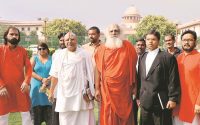PIL: Why does Supreme Court work for only 193 days in entire year?
Source – indiatoday.in
Is it not time to discontinue long vacations for courts, especially the Supreme Court (SC), when the Indian judiciary is grappling with backlog to the tune of a whopping 3.3 crore cases across the country?
A first-of-its-kind public interest litigation (PIL) has been filed before the SC demanding that court vacations, a British era practice, be cut short in order to reduce the ever-mounting pendency of cases which at present stood at a whopping 3.3 crore cases across the country.
At present, the SC has 193 working days annually, high courts 210 days and trial courts 245 days a year. However, out of 13 courts in SC, one of them sits during vacations to hear urgent cases. Even the apex court rules specify that there has to be a minimum of 225 working days, says the PIL.
When there are nearly 60,000 cases pending in SC, it has five vacations in its annual calendar. Summer break of 45 days, winter break of 15 days and Holi vacation of one week. It closes for five days each for Dussehra and Diwali.
“Direct the Ministry of Law to take appropriate steps to implement the recommendations of the Law Commission Report No. 221, 230 and 245 and direct annual calendar in a way so that the courts function at least 225 days per year and six hours per day,” said the PIL.
“Right to speedy justice is a fundamental right guaranteed under Article 21 of the Constitution,” said the PIL filed by Supreme Court lawyer and BJP spokesperson Ashwini Kumar Upadhyay.
There is a need to reduce the vacations of judges and they should sit for the whole day so that the maximum number of cases can be disposed of.
The system of vacations is legacy of the colonial rule. The situation as the country is facing demands that courts should do away with such long vacations. Every court, including apex court, must function at least six hours per day and 225 days per year, said the PIL.
Even seven decades after independence, the system of long vacations for courts – a practice introduced by the British in India to allow their judges ample time to travel home and back – continues.
Justice TS Thakur, who retired as chief justice in January last year, had suggested the summer vacation be used to hear and finalise some cases.
“I would suggest that if the counsel of both parties are willing, then I would request the Chief Justice of the high courts to allow such hearings during the summer holidays and would also request judges to hear and finalise these cases,” he had said.
“The problem of delay in disposal of case is not a new problem in India and has been in existence since a long time. However, it has now acquired terrific proportions. On the one hand, it has put the judicial system under strain and on the other hand, it has shaken the confidence of the people also. All the delay and lack of accountability and half baked schemes amount to a daily mockery of the fundamental right to speedy trial,” it said.



